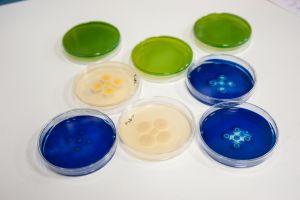A team led by researchers from the Centro Nacional de Biotecnología of the CSIC (CNB-CSIC) has taken another step in the battle against superbacteria and their resistance to multiple drugs. The scientists designed molecules able to eliminate the cellular machinery that leads these bacteria to resist conventional antibiotics. The results of this advance are published in the latest issue of the journal Cell.
Superbugs are bacterial strains resistant to several types of antibiotics. Their principal characteristic is their ability to mutate their DNA over generations to become resistant to the most common drugs. This study makes another advance in the struggle against these superbacteria, which pose a serious global health problem brought about in part by reckless, indiscriminate antibiotic use (incomplete treatment) and self-medication.
To eliminate these pathogens, the authors propose a strategy based on statins. The study shows that treatment that combines these drugs –very common in treating patients with cholesterol problems– with conventional antibiotics would be effective against infections by resistant bacteria.
This research was carried out in vivo using mice and the bacterium Staphylococcus aureus, one of the deadliest strains due to its resistance to methicillin (a common antibiotic of the penicillin group), which wreaks havoc especially in hospital environments. According to the World Health Organization, people infected with the resistant strain are 64% more likely to die than those infected with non-resistant strains.
The study focused on directly attacking those areas of the bacteria where proteins assemble to form complexes. "These microdomains in the cell membrane, called lipid rafts, are key factors because they form protein complexes associated with antibiotic resistance," says Daniel López, lead author of the study and a CNB-CSIC scientist.
Sophisticated cellular organization
To date, it had not been shown that bacteria had this complicated cellular organization based on assembly platforms like those found in eukaryotic cells (those of animals, plants, and fungi). In these cell membrane regions, the proteins responsible for forming large complexes can work efficiently. "If they are confined to these tiny “farms”, they can form molecular complexes that are important for bacterial physiology," says López.
After characterizing the proteins and lipids of the bacteria using advanced techniques including cryotomography, the scientists observed that statins could dismantle the lipid rafts. Many of these molecules are the same as those prescribed to treat some cases of high cholesterol.
"Since we know that many proteins associated with antibiotic resistance are assembled in these microdomains, we generated a strategy to break them down and try to eliminate the resistance. The molecules we designed make all proteins stop working and become disorganized. In a few words, the bacterium stops being resistant," the scientist indicates.
Combined treatment
The scientists propose combining these molecules with methicillin to treat invasive infections by superbacteria. According to López, "It would be a question of dismantling the resistance first, then attacking the bacteria directly with a common antibiotic. It's interesting because it opens up the possibility of combating superbugs in a new way."
According to the authors, this study opens the way to reusing conventional antibiotics in the fight against superbacteria, always combined with the molecules they have devised. "This would reduce the mortality caused by invasive infections," the scientist adds.
But what if the bacterium changes again and generates resistance to this treatment? According to López, this possibility is remote because eliminating the lipid rafts "lacks biological pressure for the bacterium; that is, it does not affect their survival and they would therefore not undergo changes that generate resistance."
- Source CSIC Comunicación
- Esther García-Fernández, Gudrun Koch, Rabea M. Wagner, Agnes Fekete, Stephanie T. Stengel, Johannes Schneider, Benjamin Mielich-Suss, Sebastian Geibel, Sebastian M. Markert, Christian Stigloher y Daniel López. Membrane Microdomain Disassembly Inhibits MRSA Antibiotic Resistance. Cell. DOI: 10.1016/j.cell.2017.10.012






